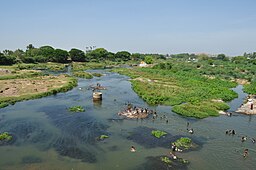Thamirabarani
| Thamirabarani (தாமிரபரணி) | |
| River | |
|
Thamirabarani River flowing across Tirunelveli
|
|
| Country | India |
|---|---|
| State | Tamil Nadu |
| Districts | Tirunelveli, Thoothukudi |
| Tributaries | |
| - left | Karaiyar, Servalar, Gadananathi, Chittar River |
| - right | Manimutharu, Pachaiyar |
| Cities | Tirunelveli, Ambasamudram |
| Source | Pothigai hills-பொதிகை மலைகள் |
| - coordinates | 8°36′07″N 77°15′51″E / 8.601962°N 77.264131°E |
| Mouth | |
| - location | Gulf of Mannar |
| - coordinates | 8°38′29″N 78°07′38″E / 8.641316°N 78.127298°ECoordinates: 8°38′29″N 78°07′38″E / 8.641316°N 78.127298°E |
| Length | 125 km (78 mi) |
| Discharge | for Sri Vai Kuntum |
| - average | 32 m3/s (1,130 cu ft/s) |
The Thamirabarani River (Porunai) (Tamil: தாமிரபரணி(பொருனை) is a perennial river that originates from the famous Agastyarkoodam peak of Pothigai hills of the Western Ghats, above Papanasam in the Ambasamudram taluk. It flows through Tirunelveli and Tuticorin districts of the Tamil Nadu state of southern India into the Gulf of Mannar. It was called the Tamraparni River in the pre-classical period, a name it lent to the island of Sri Lanka. The old Tamil name of the river is Porunai. From the source to sea, the river is about 125 kilometres (78 mi) long and is the only perennial river in South India.
From the Tamilakam era, the area of the Tamraparni river, in Tirunelveli, Tamil Nadu, has had name modifications, from the original Tan Porunai river to Tamira Porunai, from Tamraparni to Tambraparni and now called "Thamirabarani River". A meaning for the term following its derivation became "copper-colored leaf", from the words Thamiram (copper/red) in Tamil/Sanskrit and parani meaning leaf/tree, translating to "river of red leaves". According to the Tambraparni Mahatmyam, an ancient account of the river from its rise to its mouth, a string of red lotus flowers from sage Agastya at Pothigai hills transformed itself into a damsel at the sight of Lord Siva, forming the river and giving it its divine name. Other name derivations include the Pali term "Tambapanni", "Tamradvipa" of Sanskrit speakers and "Taprobana" of ancient Greek cartographers.Robert Knox reported from his 20 years of captivity on the island in the hills that "Tombrane" is a name of the Sri Lankan Tamil people for God in Tamil, which they often repeated as they lifted up their hands and faces towards Heaven".
...
Wikipedia

